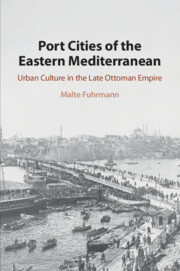Book contents
- Port Cities of the Eastern Mediterranean
- Port Cities of the Eastern Mediterranean
- Copyright page
- Contents
- Figures and Table
- Acknowledgments
- Part I Introduction
- Part II Constructing Europe
- Part III The City’s New Pleasures
- Part IV Identities on the Mediterranean Shore
- 14 Educational Imperialism or Enlightenment?
- 15 The French-Language Press
- 16 Renegotiating Masculinities and Femininities at the Turn of the Century
- 17 Reining in the Free Experiment
- 18 Urban Milieus vs. National Communities
- 19 North-to-South Migration and Its Impact on the Urban Population
- Part V The End of the European Dream
- Part VI Europe and the Eastern Mediterranean Revisited
- Bibliography
- Index
18 - Urban Milieus vs. National Communities
The Case of the Levantines
from Part IV - Identities on the Mediterranean Shore
Published online by Cambridge University Press: 09 October 2020
- Port Cities of the Eastern Mediterranean
- Port Cities of the Eastern Mediterranean
- Copyright page
- Contents
- Figures and Table
- Acknowledgments
- Part I Introduction
- Part II Constructing Europe
- Part III The City’s New Pleasures
- Part IV Identities on the Mediterranean Shore
- 14 Educational Imperialism or Enlightenment?
- 15 The French-Language Press
- 16 Renegotiating Masculinities and Femininities at the Turn of the Century
- 17 Reining in the Free Experiment
- 18 Urban Milieus vs. National Communities
- 19 North-to-South Migration and Its Impact on the Urban Population
- Part V The End of the European Dream
- Part VI Europe and the Eastern Mediterranean Revisited
- Bibliography
- Index
Summary
Historians have debated whether Levantines, that is, locally integrated groups with hereditary ties to Western/Central Europe and/or the Catholic Church around the Eastern Mediterranean constituted a proto-ethnic group identity or were merely lumped together by pejorative exonyms. A close reading of Levantine writers' statements or lack thereof reveals that nineteenth-century "Levantine" intellectuals did not lay claim to a group identity, but rather to a space that allowed for ambivalent identities and spaces. Only twentieth-century authors cast Levantine identity as a quasi-ethnicity. The more recent generation has combined the latter assumption with the nostalgia produced by the former.
- Type
- Chapter
- Information
- Port Cities of the Eastern MediterraneanUrban Culture in the Late Ottoman Empire, pp. 288 - 301Publisher: Cambridge University PressPrint publication year: 2020

